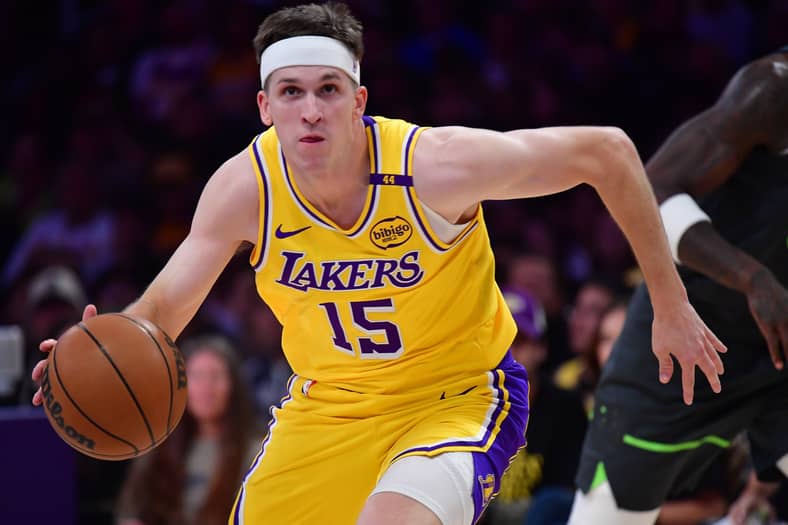The Los Angeles Lakers’ 2024–25 campaign came to a disappointing end with a swift first-round playoff exit at the hands of the Minnesota Timberwolves. Despite a restructured roster built around Luka Dončić and the enduring presence of LeBron James, the Lakers fell in just five games—marking a harsh conclusion to a season filled with championship hopes.
One of the most notable letdowns of the series was guard Austin Reaves. After a standout regular season in which he averaged a career-best 20.2 points and became a critical piece of the Lakers’ offense, Reaves struggled mightily when it mattered most. His postseason production dipped to 16.2 points on 41.1% shooting, including just 31.9% from beyond the arc. In fourth quarters across the five games, he managed only three points per outing—highlighting his disappearing act in clutch moments.
Reaves owned up to his struggles during his exit interview.
“Obviously I didn’t have the series that I wanted to have,” Reaves admitted. “You could point the finger at me. I really don’t care. I wasn’t good enough to help us be successful… I struggled. You live and you learn.”
That level of self-awareness has made Reaves a fan favorite and a respected figure in the locker room. Still, his underwhelming playoff performance—combined with his evolving contract situation—has raised serious questions about his long-term future in Los Angeles.
The Lakers can offer Reaves a four-year, $83 million extension this August. However, that’s far below what he could command on the open market. Should he decline, Reaves would become an unrestricted free agent in 2026, eligible for a five-year, $246 million maximum deal.
A Western Conference executive put it bluntly:
“They know they’re not getting anything done with Austin Reaves. He doesn’t have to settle now. He can wait and choose his best option.”
Though the league’s tighter salary cap structure may limit free-agent spending, the executive issued a warning to L.A.:
“There might not be a lot of money out there—but don’t assume that. Teams like Brooklyn, Washington, or even the Clippers could create space.”
In the short term, Reaves remains a bargain on a $14 million annual deal. But the playoffs exposed his limitations: he struggled defensively against stronger backcourts and his skill set overlaps with Dončić’s ball-dominant style, creating redundancy in the lineup.
Veteran columnist Bill Plaschke of the Los Angeles Times didn’t mince words:
“If Austin Reaves is the Lakers’ third-best player, they’re going to have a difficult time winning a championship. If he’s in their Big Three, they don’t have a Big Three.”
The implication is clear: despite his statistical impact—20 points, six assists, five rebounds, and 73 starts—Reaves may not be part of a championship formula.
Plaschke’s conclusion was stark:
If the Lakers truly value acquiring a big man, they’re going to have to get rid of the little fella. Damn, I hate writing these next three words. Trade Austin Reaves.”
Lakers GM Rob Pelinka signaled a need for changes, particularly in the frontcourt where Rudy Gobert dominated them with ease.
“It would be great to have a center that’s a vertical and lob threat, and who can protect the paint,” Pelinka said. “There are different types of centers… but we know we need one.”
Translation: no one is untouchable—not even Reaves. To land a transformative player like Giannis Antetokounmpo or Joel Embiid, the Lakers may have to part with valuable assets. Reaves, with his youth, contract, and upside, could be a key piece in such a deal.
That said, a trade isn’t imminent. Both Dončić and James reportedly value Reaves, and the front office isn’t actively shopping him. But as Plaschke noted, to get something special, you have to give up something special.
Reaves appears to understand the uncertain road ahead.
“Quite frankly, nobody thought I’d be in this position,” he said. “I’ve continued to prove myself… I just needed to be better and I wasn’t.”
He’s still young, still improving, and still beloved by many in L.A. But in a league where sentiment often yields to strategy, the Lakers may have to make a tough call—and soon.

